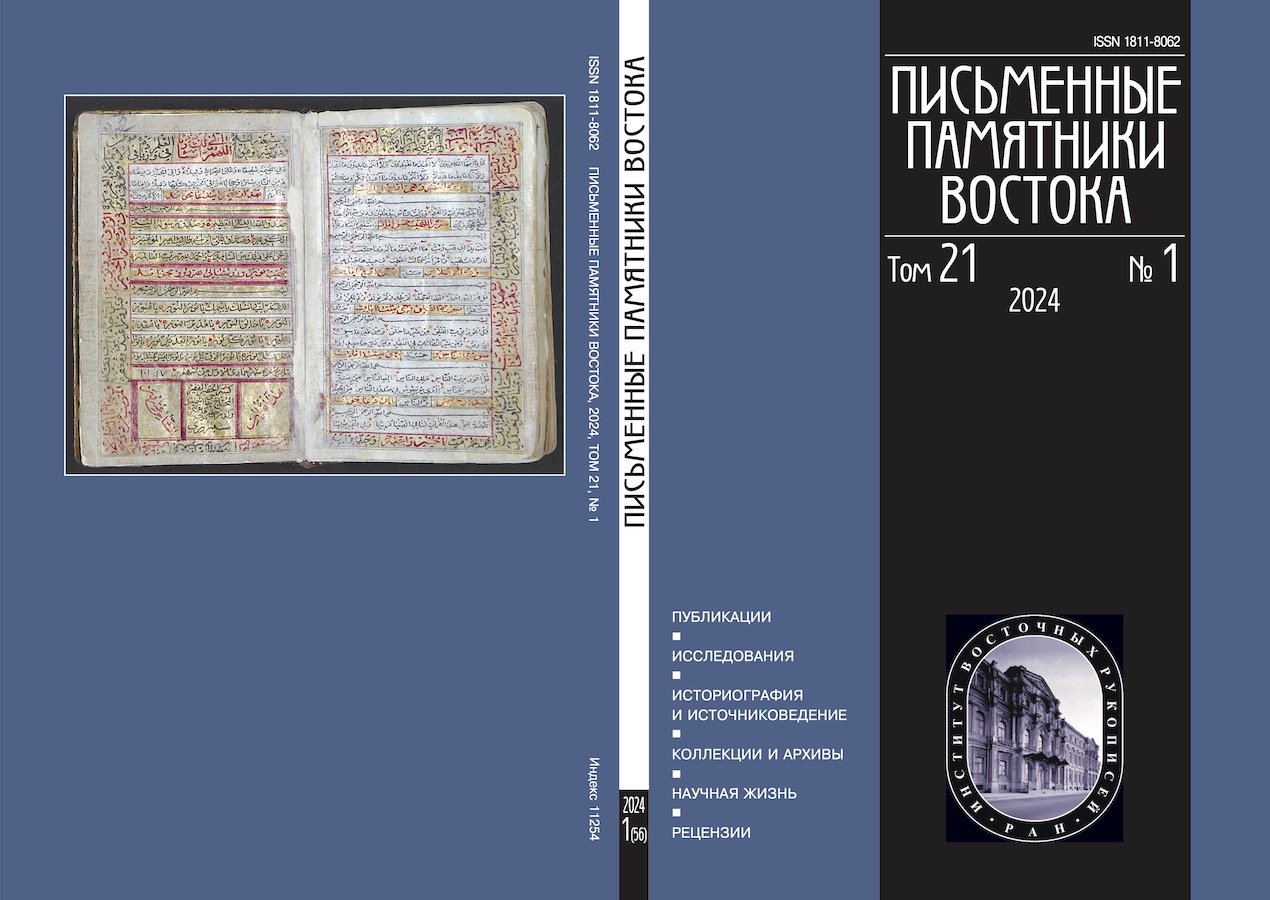Критика учения Бхартрихари об уровнях речи в «Шивадришти» Сомананды
- Авторы: Десницкая Е.А.1
-
Учреждения:
- Институт восточных рукописей РАН
- Выпуск: Том 21, № 1 (2024)
- Страницы: 36-48
- Раздел: Исследования
- Статья опубликована: 21.05.2024
- URL: https://journals.eco-vector.com/1811-8062/article/view/625853
- DOI: https://doi.org/10.55512/WMO625853
- ID: 625853
Цитировать
Полный текст
Аннотация
Кашмирский философ Сомананда (X в. н.э.), основатель традиции пратьябхиджня, критиковал грамматиста Бхартрихари (V в. н.э.) за отождествление «зрящей» речи пашьянти с Брахманом. Последующие философы школы пратьябхиджня включили учение Бхартрихари об уровнях речи в состав собственной доктрины и дополнили четвертой высшей речью (пара вач). Современные исследователи традиции пратьябхиджня склонны полагать, что учение о четырех уровнях речи было известно уже Бхартрихари и что Сомананда критиковал Бхартрихари потому, что был недостаточно хорошо знаком с его трудами. В статье подробно рассматривается учение об уровнях речи в «Вакьяпадии» Бхартрихари и в комментариях, а также история трансформации этого учения в работах кашмирских шиваитов. Проведенный анализ позволяет прийти к выводу, что приписывание Бхартрихари четвертого уровня речи безосновательно, а Сомананда в своей критике верно выявил проблематичность онтологического статуса речи в лингвистической философии Бхартрихари.
Ключевые слова
Об авторах
Евгения Алексеевна Десницкая
Институт восточных рукописей РАН
Автор, ответственный за переписку.
Email: khecari@yandex.ru
ORCID iD: 0000-0001-7890-2061
кандидат философских наук, научный сотрудник сектора Южной Азии Отдела Центральной и Южной Азии
Россия, Санкт-ПетербургСписок литературы
- Десницкая 2021 — Десницкая Е.А. Инклюзивизм как категориальное средство в работах Пауля Хакера и Герхарда Оберхаммера // Вопросы философии. 2021. № 5. С. 191–200. doi: 10.21146/0042-8744-2021-7-191-200.
- Десницкая 2022 — Десницкая Е.А. Инклюзивизм, перспективизм и плюралистические тенденции в истории индийской культуры // Вестник Российского университета дружбы народов. Серия: Философия. 2022. Т. 26. № 2. С. 342–352. doi: 10.22363/2313-2302-2022-26-2-342-352.
- Десницкая 2023а — Десницкая Е.А. Истоки представления о Шабда-Брахмане // Asiatica: Труды по философии и культурам Востока. 2023. Т. 17. № 1. С. 64–79.
- Десницкая 2023б — Десницкая Е.А. Лингвистический абсолютизм в «Вакьяпадии» Бхартрихари // Вестник НГУ. Серия: История, филология. 2023. Т. 22. № 10: Востоковедение. С. 132–142. doi: 10.25205/1818-7919-2023-22-10-132-142.
- Иванов 2014 — Иванов В.П. «Атомизм» в звуковых построениях индийской тантры // Вопросы философии. 2014. № 6. С. 132–142.
- Bronkhorst 1995 — Bronkhorst J. Studies on Bhartṛhari, 7: Grammar as the Door to Liberation // Annals of the Bhandarkar Oriental Research Institute. 1995. Vol. 76. No. 1. P. 97–106.
- Buitenen 1962 — Buitenen J.A.B. van (ed.). The Maitrāyaṇīya Upaniṣad: A Critical Essay with Text, Translation and Commentary. Hague: Mouton, 1962.
- Chatterji 1913 — Chatterji J.C. (ed.). Rāmakaṇṭha. Spandakārikāvivṛti. Srinagar: KSTS, 1913.
- Desnitskaya 2018 — Desnitskaya E. Language and Extra-linguistic Reality in Bhartṛhari’s Vākyapadīya // Sophia. 2018. Vol. 57(4). P. 643–659. doi: 10.1007/s11841-018-0645-x.
- Houben 1995 — Houben Jan Е.М. The Saṃbandha-Samuddeśa (Chapter on Religion) and Bhartrhari’s Philosophy of Language. Groningen: Egbert Forsten, 1995.
- Iyer 1966 — Iyer K.A.S. (ed.). Vākyapadīya of Bhartṛhari with the Commentaries Vṛtti and Paddhati. Kāṇḍa I. Poona: Deccan College, 1966.
- Iyer 1969 — Iyer K.A.S. Bhartṛhari: A Study of the Vākyapadīya in the Light of the Ancient Commentaries. Poona: Deccan College, 1969.
- Joshi, Roodbergen 1986 — Joshi S.D., Roodbergen J.A.F. (eds). Patañjali’s Vyākaraṇa-Mahābhāṣya. Paspaśāhnika. Poona: University of Poona, 1986.
- Nemec 2011 — Nemec J. The Ubiquitous Śiva. Vol. I: Somānanda’s Śivadṛṣṭi and His Tantric Interlocutors. Oxford: Oxford University Press, 2011.
- Raja, Coward 1995 — Raja K.K., Coward H.G. The Encyclopedia of Indian Philosophies. Vol. 5: The Philosophy of the Grammarians. Delhi: Motilal Banarsidass, 1995.
- Singh 1980 — Singh J. (ed.). Pratyabhijñāhṛdayam: The Secret of Self-recognition. Delhi: Motilal Banarsidass Publ., 1980.
- Torella 1992 — Torella R. The Pratyabhijñā and the Logical-Epistemological School of Buddhism // Goudriaan T. (ed.). Ritual and Speculation in Early Tantrism: Studies in Honor of André Padoux. Albany: State University of New York Press, 1992. P. 327–345.
- Torella 1994 — Torella R. (ed.). The Īśvarapratyabhijñākārikā of Utpaladeva with the Author’s Vṛtti: Critical Edition and Annotated Translation. Roma: Istituto italiano per il medio ed estremo oriente, 1994 (Serie Orientale Roma. T. 71).
Дополнительные файлы








